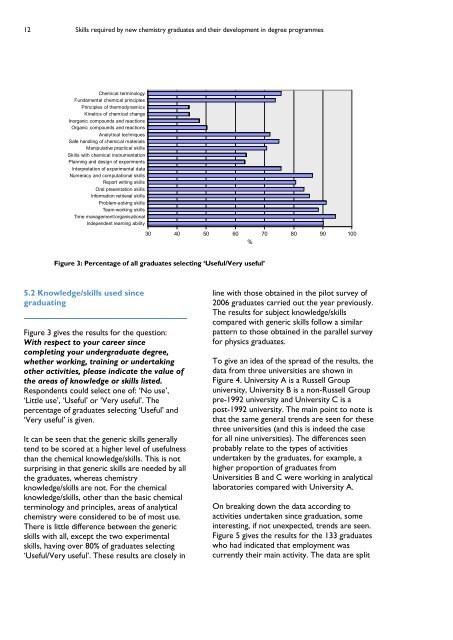Skills required by new chemistry graduates - Higher Education ...
Skills required by new chemistry graduates - Higher Education ...
Skills required by new chemistry graduates - Higher Education ...
You also want an ePaper? Increase the reach of your titles
YUMPU automatically turns print PDFs into web optimized ePapers that Google loves.
12 <strong>Skills</strong> <strong>required</strong> <strong>by</strong> <strong>new</strong> <strong>chemistry</strong> <strong>graduates</strong> and their development in degree programmes<br />
Chemical terminology<br />
Fundamental chemical principles<br />
Principles of thermodynamics<br />
Kinetics of chemical change<br />
Inorganic compounds and reactions<br />
Organic compounds and reactions<br />
Analytical techniques<br />
Safe handling of chemical materials<br />
Manipulative practical skills<br />
<strong>Skills</strong> with chemical instrumentation<br />
Planning and design of experiments<br />
Interpretation of experimental data<br />
Numeracy and computational skills<br />
Report writing skills<br />
Oral presentation skills<br />
Information retrieval skills<br />
Problemsolving skills<br />
Teamworking skills<br />
Time management/organisational<br />
Independent learning ability<br />
30 40 50 60 70 80 90 100<br />
%<br />
Figure 3: Percentage of all <strong>graduates</strong> selecting ‘Useful/Very useful’<br />
5.2 Knowledge/skills used since<br />
graduating<br />
Figure 3 gives the results for the question:<br />
With respect to your career since<br />
completing your undergraduate degree,<br />
whether working, training or undertaking<br />
other activities, please indicate the value of<br />
the areas of knowledge or skills listed.<br />
Respondents could select one of: ‘No use’,<br />
‘Little use’, ‘Useful’ or ‘Very useful’. The<br />
percentage of <strong>graduates</strong> selecting ‘Useful’ and<br />
‘Very useful’ is given.<br />
It can be seen that the generic skills generally<br />
tend to be scored at a higher level of usefulness<br />
than the chemical knowledge/skills. This is not<br />
surprising in that generic skills are needed <strong>by</strong> all<br />
the <strong>graduates</strong>, whereas <strong>chemistry</strong><br />
knowledge/skills are not. For the chemical<br />
knowledge/skills, other than the basic chemical<br />
terminology and principles, areas of analytical<br />
<strong>chemistry</strong> were considered to be of most use.<br />
There is little difference between the generic<br />
skills with all, except the two experimental<br />
skills, having over 80% of <strong>graduates</strong> selecting<br />
‘Useful/Very useful’. These results are closely in<br />
line with those obtained in the pilot survey of<br />
2006 <strong>graduates</strong> carried out the year previously.<br />
The results for subject knowledge/skills<br />
compared with generic skills follow a similar<br />
pattern to those obtained in the parallel survey<br />
for physics <strong>graduates</strong>.<br />
To give an idea of the spread of the results, the<br />
data from three universities are shown in<br />
Figure 4. University A is a Russell Group<br />
university, University B is a non-Russell Group<br />
pre-1992 university and University C is a<br />
post-1992 university. The main point to note is<br />
that the same general trends are seen for these<br />
three universities (and this is indeed the case<br />
for all nine universities). The differences seen<br />
probably relate to the types of activities<br />
undertaken <strong>by</strong> the <strong>graduates</strong>, for example, a<br />
higher proportion of <strong>graduates</strong> from<br />
Universities B and C were working in analytical<br />
laboratories compared with University A.<br />
On breaking down the data according to<br />
activities undertaken since graduation, some<br />
interesting, if not unexpected, trends are seen.<br />
Figure 5 gives the results for the 133 <strong>graduates</strong><br />
who had indicated that employment was<br />
currently their main activity. The data are split
















